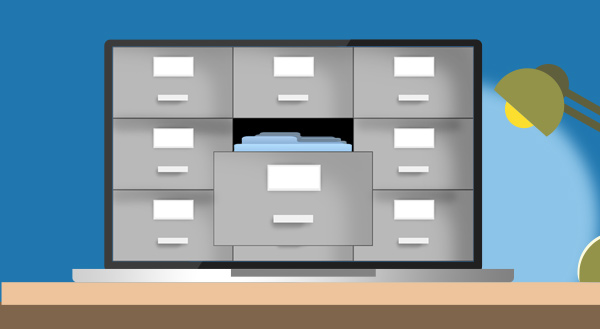To Archive or to Backup? That is the Question
Hamlet often pondered whether to be or not. You could be more focused on whether backup or archiving is the better option for your company. You understand that you need to secure your data, but to archive or to backup? That is the question.
This blog will compare and contrast the advantages of either backing up or archiving your data.
In the past, businesses kept crucial information on paper. For convenience, essential documents and records were stored in nearby filing cabinets.
When files begin to pile up and the cabinet drawers couldn’t hold them, someone would be tasked with doing a big clean out. The older, more important documents would be packed up and stored in the basement or some storage facility. They may still be needed for tax or compliance purposes, among other things.
The same is true of digital business data. You can restore it from a backup in the event of a hardware failure, cyberattack, or disaster. You might also archive the data for a later-date retrieval and space management.
Which is the right option for you?
To weigh your options for the right form of data storage, you’ll need to consider:
- The period of time you need the data stored;
- What security the method offers against loss or illicit access;
- Whether the data is easily restored or retrieved;
- How accessible, available and searchable the data will be;
- Industry and or Compliance Standards that need to be met.
Backing Up
Simply put, a backup is a copy of your data. You should be regularly making a copy of you business data to serve as a starting point in the case of a disaster. You’ll select how often to back up your data based on how frequently it changes and how important the data currency is to you.
When you back up data, an operating system, or application files, the originals aren’t lost. Your older backup, on the other hand, may be deleted when you make a fresh copy. If not, the backup can be used for something else. It may enable users to review or recover previous versions.
Having multiple backups is always a good idea. We recommend using the “3-2-1” backup technique. This means you’ll have 3 duplicated of your business data. One would be in the cloud, while the other two would be on separate devices (e.g. on your local computer and on a backup drive).
Archiving
Archiving on the other hand, is the process of storing a copy of business data for long term use. This is the equivalent of moving that box of documents to the basement. Typically, the archived version of the data becomes the only copy available.
The archived permanent record of data may later come in handy for future legal matters. Archived data is documented and marked to make finding easier later on. Moving data to an archive can speed up processing and increase storage capacity.
Although a backup can be rewritten, archive data can rarely be changed or deleted. Often, it is a physically disconnected copy taken from the computer or network.
Click here to check out some of our Data Recovery Services
Main Points to Remember
Basically, you’ll use a backup to restore your data if something were to happen and turn to the archives to retrieve and refer to information data.
Both backup and archiving can prove to be beneficial, especially for businesses. It won’t happen every day, but entire data archives can get lost if a server is hit in a flash flood. In the event of an electrical fire, all the paper backups could be reduce to cinders. During a hurricane, that external hard drive could be stolen or crushed by falling debris.
That’s why it’s important to avoid only having a single point of storage. It’s a good idea to back up AND archive your company’s data. The best way to protect business continuity is preparing for the worst.
If you need assistance with backups, archives or both, feel free to contact us here at Stan’s Garage. Begin securing your company’s data today with our help!
Call us at (323) 761-2634. We’d be happy to assist you and all your technology needs.
We are located in West Hollywood, servicing the greater Los Angeles area!

